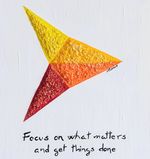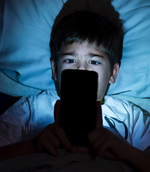How Blue Light Affects Your Sleep and What You Can Do About It
Mar 11, 2024 by Vreny Blanco · 8 min read · Digital Wellness
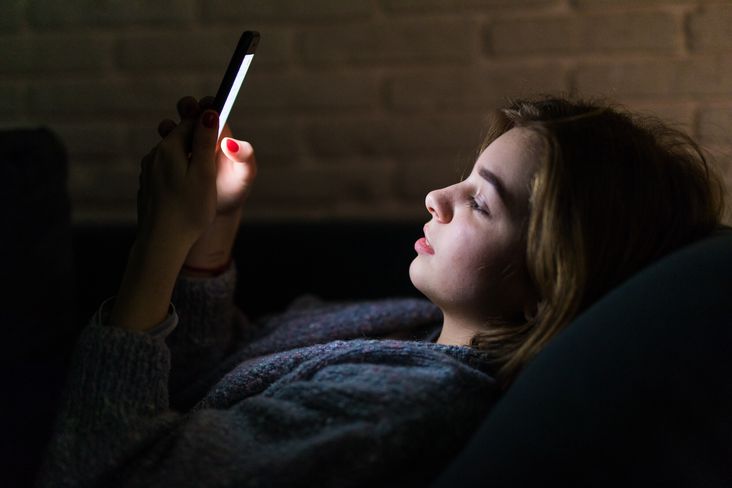
Have you ever noticed how using your phone or computer before bed can make it harder to fall asleep? Studies have shown that exposure to light, especially blue light, affects our sleep patterns.1 2 This impact is largely due to its effect on melatonin production, the hormone that signals to our bodies that it’s time to sleep. A decrease in melatonin levels can significantly disrupt our ability to fall asleep easily.
In this blog post, we will examine the effects of blue light on melatonin production and its associated effects on our circadian rhythms.
What is Melatonin?
Melatonin, a hormone produced by the pineal gland in the brain, plays a critical role in regulating our circadian rhythms – our internal clock that signals our body when it’s time to sleep.3 The primary function of the pineal gland is to gather information about the light-dark cycle from the environment and convey this information through the production and secretion of melatonin.4
Darkness triggers melatonin production, while light inhibits it, directly affecting the quality and duration of our sleep.3 In addition to its key role in regulating seasonal physiology and influencing the circadian system and sleep patterns, melatonin also contributes to cellular and neuroprotection and the reproductive system.4
What is Blue Light?
Blue light is a type of light that is part of the visible light spectrum. It has a short wavelength, which means it possesses more energy compared to other types of light. The primary source of blue light is the sun, but it is also emitted by LED lights and digital screens.
The high energy of blue light allows it to penetrate deep into the eye, sending signals to the pineal gland in the brain that regulates the body’s sleep-wake cycle. The natural blue light we receive from sunlight helps keep those cycles in sync, enabling us to fall asleep easily and wake up the next day.5
Exposure to blue light during the day is essential to balance our biological needs and affects our body and mind in both visual and non-visual ways, primarily by regulating human behavior and circadian rhythms.
However, inappropriate exposure to light (especially from artificial sources of blue light in the evening or at night) can lead to adverse health effects. Because of its high energy, blue light can induce and accelerate photochemical reactions and retinal cell damage.1
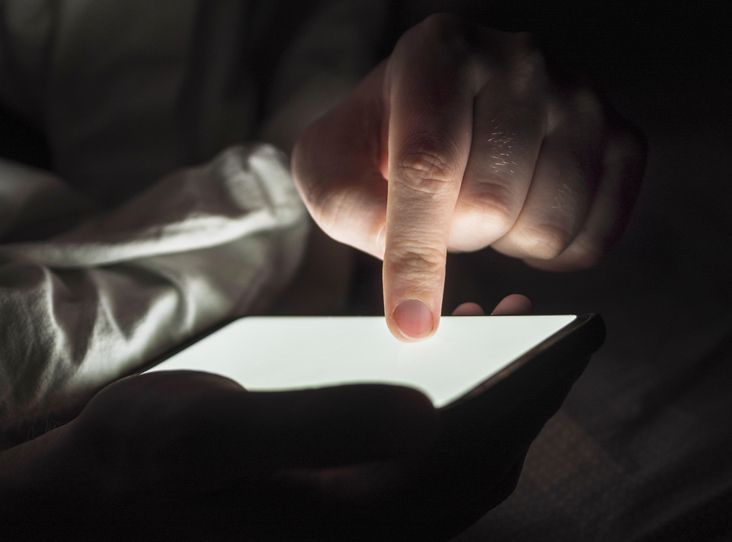
How Light Affects Melatonin Production
Blue light exposure is beneficial during the day, improving alertness and mood.
However, its effects tend to be more disruptive at night. The rise of screen-based technology and energy-efficient lighting has increased our exposure to blue wavelengths, especially after sunset.2
A study published in The Journal of Clinical Endocrinology & Metabolism found that room light suppresses melatonin and shortens melatonin duration. Exposure to room light (<200 lux) in the evening suppresses the onset of melatonin synthesis. This results in a reduction in melatonin production for approximately 90 minutes compared to exposure to dim light (<3 lux). When room light exposure continues throughout the night, total daily melatonin is suppressed by more than 50% in most individuals, with a median suppression of 73.7%.
Such findings suggest that exposure to room light at bedtime and during normal sleep periods (e.g. during shift work) may affect physiological processes regulated by melatonin signaling, such as sleepiness, thermoregulation, blood pressure, and perhaps even glucose homeostasis.6
Further research has shown that light within the blue to blue-green spectrum (446-477 nm) is particularly effective in reducing melatonin levels. This suggests the existence of a specialized light sensor in our eyes, distinct from the rods and cones used for standard vision, dedicated to regulating our sleep and wake cycles. This sensor is uniquely sensitive to a narrow band of blue light, suggesting that light in the blue to blue-green range is especially potent in suppressing melatonin production.7
Harvard researchers have also demonstrated that exposure to blue light can inhibit melatonin production for about twice as long as green light and has the potential to shift our circadian rhythms by up to three hours.2 This underscores the significant effect blue light has on our natural sleep cycles and highlights the importance of managing our exposure to such light sources in the evening.
An understanding of the specific wavelengths of light that affect melatonin production provides valuable insight into how to design more sleep-friendly lighting in our homes and workplaces.
Note: Lux is a measure for illuminance, i.e. the amount of light passing through a surface or reaching the eye. It therefore determines the effect that light has on you.8
How Blue Light Affects Sleep
Exposure to blue light, particularly at night, can suppress melatonin production, leading to a range of health and sleep-related problems, including:
Sleep Disruption
Reduced melatonin levels can lead to difficulty falling asleep, reduced sleep quality, and decreased sleep duration. This contributes to overall sleep deprivation, which adversely affects both mental and physical health.2
Circadian Rhythm Disorders
Circadian rhythm disorders, or disruptions in the sleep-wake cycle, refer to the disturbances that occur when the internal biological clock responsible for regulating our sleep and activity periods is out of sync with the environment.
Chronic exposure to blue light at night can inhibit melatonin production and disrupt circadian rhythms. This disruption may lead to long-term sleep disturbances that affect your daily functioning and overall well-being.9
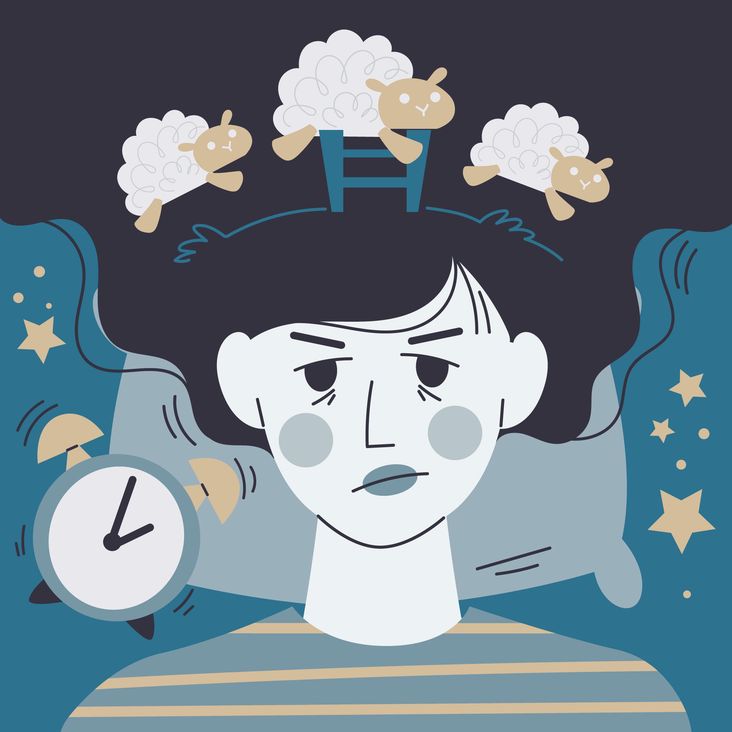
Strategies to Minimize the Effects of Blue Light
Given that blue light can negatively affect melatonin production and therefore our health, it’s crucial to implement preventive measures, especially during the evening and nighttime hours.
Opt for Soft Ambient Lighting
Dim the lights in your home in the hours leading up to bedtime. Maintaining a low lighting level for up to two hours before bedtime signals to your biological clock that it’s time to prepare for sleep. You can program the lights in your room to automatically adjust their intensity at the same time every day. I use the Philips Hue app for this.
Wear Blue Light Filter Glasses
If your job or daily activities require prolonged use of electronic devices, consider wearing blue light filtering glasses. These glasses can block or filter the amount of blue light that reaches your eyes without significantly affecting color perception.
Adjust the Screen Settings on Your Devices
In addition to using blue light filters, adjust the brightness and contrast of your devices to the lowest level possible without compromising your visual comfort. Many devices also offer a night mode or similar setting that automatically reduces blue light emissions based on the time of day.
Do Relaxing Activities Before Bed
Creating a nighttime routine that promotes relaxation can help prepare your body and mind for sleep. Activities such as reading a book (preferably on paper), meditating, doing breathing exercises, or taking a warm bath can be excellent ways to reduce stress and improve sleep quality.
Limit Screen Time
Avoid using electronic devices at least an hour before bedtime to minimize exposure to blue light.
Use an app and website blocker like 1Focus to limit exposure to distracting content at bedtime, such as social media, Netflix, email, and more. With 1Focus, you can create a schedule to block all apps and websites at night. This can help you establish a consistent bedtime and wake-up routine, which can help regulate your body’s internal clock. A consistent sleep schedule can improve mood, cognitive function, and energy levels.
The 20-20-20 Rule
To reduce eye strain from prolonged screen use, follow the 20-20-20 rule: every 20 minutes, look at something about 20 feet away for 20 seconds. This brief visual break can help alleviate symptoms like dry eyes, blurred vision, and headaches, especially for those who spend many hours in front of screens.
Create an Optimal Sleeping Environment
Make sure your bedroom is set up to promote a good night’s rest. This includes keeping the room cool, dark, and quiet. Consider using blackout curtains or blinds to block outside light.
Conclusion
Exposure to blue light, especially in the evening or at night, can suppress melatonin production more than any other type of light. This decrease shortens the amount of time melatonin is active in our bodies, disrupting our natural internal clock that tells us it’s time to rest for the night.
By understanding how blue light affects our bodies and adopting strategies to mitigate its effects, we can protect our sleep and our health in the digital age.
Disclaimer: If you suffer from sleep disorders and self-help strategies do not resolve the issue, it is strongly recommended to consult a healthcare professional for a thorough evaluation and appropriate treatment.
Further Reading
For more tips on how to get a good night’s sleep, read our article How to Improve the Quality of Your Sleep.
Subscribe to the 1Focus Blog RSS feed and stay on top of the latest productivity strategies.


